Alumni Spotlight: Stephen Fife '88
The Alumni Spotlight is a place to hear from the School of the Arts alumni community about their journeys as artists and creators.
Stephen Fife's '88 plays Savage World, Break of Day and This Is Not What I Ordered have been published by Samuel French. Other plays include Sizzle Sizzle, Blue Kiss, Mickey’s Home, Scattered Blossoms, FutureSex, The Shadow Man and The American Wife (with Ralph Pezzullo). His adaptation of Sholem Asch’s God of Vengeance was produced Off-Broadway by the Jewish Repertory Theatre, where it received 17 rave reviews, and has been performed all over the world. Cune Press has published his memoir The 13th Boy (featured in People Magazine and The Huffington Post) and Best Revenge: How the Theatre Saved My Life and Has Been Killing Me Ever Since, as well as two books of poetry, Dreaming in the Maze of Love-Grief-Madness and U & Me & The City. His articles and essays on the arts have appeared in The New York Times Arts & Leisure section, the Village Voice and the New Republic (among others), and he has edited several volumes of monologues and scenes for Applause Books. Fife's screenplay adaptations of his plays Blue Kiss and Sizzle Sizzle are both scheduled to be filmed in 2016. He is currently based in the Los Angeles area.
Was there a specific faculty member or peer who especially inspired you while at the School of the Arts? If so, who and how?
I was inspired by three teachers in particular during my years at School of the Arts.
Andrew Sarris is someone I already knew from the two years I had spent at the Village Voice as a features writer on the Arts. He was always a fount of knowledge and collegiality. But when I took his course at Columbia, I was just bowled over by the scope of his thinking about movies, as well as by the depth of his commitment to the art form. And he was always so much fun to spend time with, whether in a lecture forum or one-on-one (he made them feel like the same thing).
George Ferencz was my theater directing teacher, and I loved how out there he was, how open he was to considering all kinds of concepts, no matter how crazy they might seem. George's production at Columbia of Sam Shepard's early plays, a series he called "Shep in Rep," were a turning point for me, in terms of making me aware of what could be done onstage. The way he made Shepard's poetic excursions both very real in the moment and completely surreal in their reflections on the human condition had a profound effect on me, enlarging my sense of what it was possible to do.
But probably the teacher who had the most lasting effect on me was Albert Innaurato, who was one of several playwriting instructors I had there. Albert could be very off-putting, often attacking our lazy attempts to please him with our writing assignments. But it was this very honesty, this no-holds-barred ferocity, that taught me so much about how to construct a play and how to survive as a playwright. Albert's passion was unbounded. Albert's commitment verged on the self-destructive. But it was this very sense of how much was at stake for the playwright, and how painful the life of the playwright could be, that prepared me better than anyone else for the life that I have lived since then. Albert may not have been the most likable teacher I had, but he was the one who made me feel that making art was a life-and-death endeavor— and that may be the most important lesson I ever learned.
How did attending the School of the Arts impact your work and career as an artist?
It increased my sense of commitment to work that I had to self-generate. That is, it was up to me to make the art that I dreamed about, I couldn't depend on anyone else to commission me or even encourage me. I wish that the school had helped me make more professional contacts that would have helped me get my work produced, but I'm glad to have had the encouragement that the school itself provided.
What were the most pressing social/political issues on the minds of the students when you were here?
Nuclear Disarmament.
If you could revisit any piece you created during your time at the School of the Arts, which would it be? Why?
I developed my thesis essay into my play Savage World, which was published last year by Samuel French. Still hoping to adapt this into a movie.
What was your favorite or most memorable class while at the School of the Arts?
The ones with the teachers I've already mentioned.
